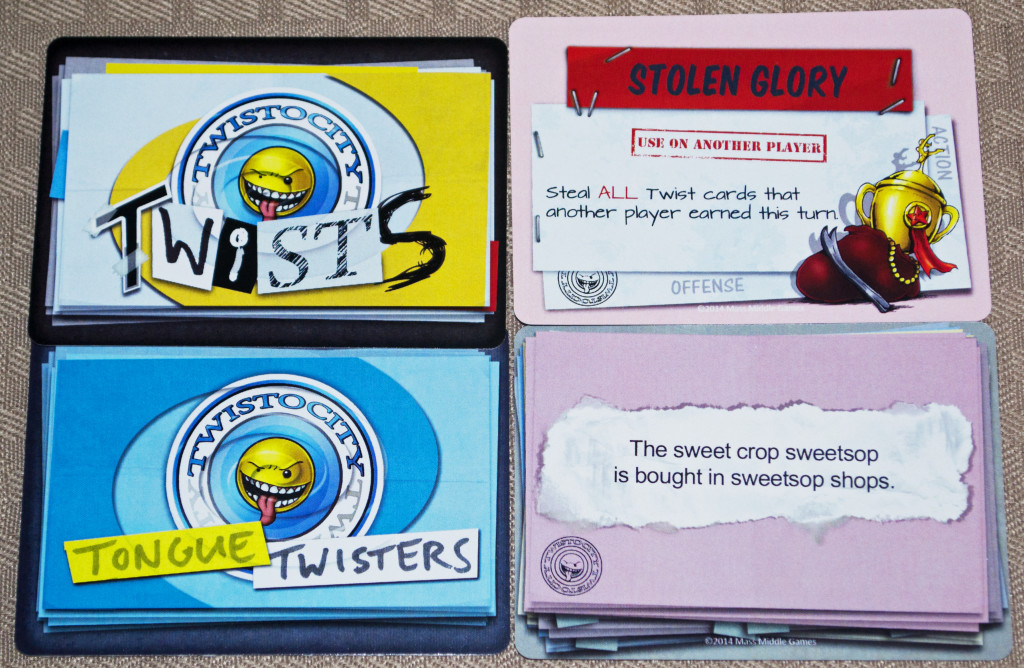Tongue twisters do more than make you look like a blubbering idiot…in fact they’re quite educational in the sense that they help improve one’s pronunciation skills. “Twistocity”, a game that’ll be seeking your support in June of 2015, takes this idea a step further and forces players to do silly voices on top of the tongue twister they’ve been assigned. Special thanks to Michael Kiely, the founder of Mass Middle Games, for reaching out and providing me with a prototype copy. It’s important to stress that prototypes are not often reflective of the final product, making everything you see below (including the rules) subject to change.
My prototype copy came with tongue twister cards and twist cards. Tongue twister cards are exactly what they sound like in that they list a tongue twister for the player to read aloud to others. Twist cards, on the other hand, are bit more varied. Twist cards are comprised of both persona cards and action cards, the former of which will instruct players to act out a tongue twister in a particular voice. The action cards are both offensive (red) and defensive (blue) in nature and can either hurt your opponents or assist you, respectively.
Setting up the game proved to be really simple in that all you’ll need to do is shuffle both decks of cards into two separate piles. Each player is dealt one twist card and someone is chosen to go first. On their turn, the active player picks up a tongue twister and immediately (important!) begins speaking once the card is flipped. The other players will then judge as to whether or not the card was read perfectly. If it was, the active player keeps the tongue twister card as a “point” for endgame scoring and receives two twist cards. If they failed, they receive one twist card. Play then passes to the left.
Failing a card is actually pretty easy to do as pausing, reciting at a slow pace, and mispronouncing the words all count against you. Luckily, twist cards can be played at any time so as long as some basic rules are followed. For one, you can’t play a twist card when someone is speaking a tongue twister. Additionally, only one persona can be in play at a time AND some action cards will actually specify when they can be used. Again, these action cards can make things easier on you or really screw up your opponents if used at the right time.
The first player to reach ten points wins the game. Alternatively, the player with the most points when the tongue twister pile runs out wins the game (this can happen if a lot of people fail their tongue twisters).
While the rules are fairly straight forward, I like the fact that players can modify the game as they see fit. For example, younger players or people with speech impediments can be given mulligans or more leeway when reading tongue twister cards. You can take out the action cards altogether and leave only the persona cards, just as another example. While the age limit is 14+, I do believe you could play with kids significantly younger assuming you make the appropriate adjustments. Some cards might be interpreted by some as borderline embarrassing (I was fine with them), so parents may need to filter the decks a bit beforehand depending on their comfort level. You could even make up your own deck of persona cards that consist of popular cartoon characters…be creative!
“Twistocity” is a very social experience, one that benefits the most in a setting where there are lots of people. Better yet, said people should have open minds and a sense of humor. While the player limit is six, you could (in theory) include more people and only play to say, five points. As I mentioned above, the game is pretty flexible that way. There’s a lot here, whether you’re playing this game to hone your pronunciation skills or to make a potential “frenemy” get tongue-tied for once in their life.
—
You can learn more about and support “Twistocity” by visiting its Kickstarter page, here:
https://www.kickstarter.com/projects/861197367/twistocity-a-tongue-twister-party-game
—
https://www.youtube.com/watch?v=kjNn1oSZrak

